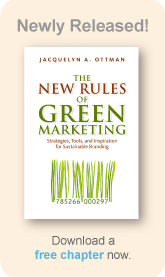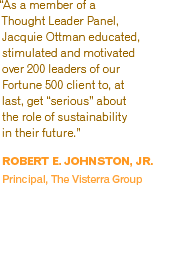The Power to Cross the Divide
By Jacquelyn A. Ottman
InBusiness, March/April 2002
In 1994, British inventor Trevor Bayliss, a former swimming pool builder and circus "escapologist," invented the first battery-less radio, a heavy black box with a hand crank jutting out from its side. The radio, powered entirely by the unwinding of an old fashioned clockwork-like spring, was Bayliss’s response to the critical need to distribute information about AIDS and birth control in communities where electrical grids are hard to access, batteries hard to find and impossible to recycle.
In 1995 the Times of London hailed the device as "the most significant invention in a generation." It has won countless awards from humanitarian as well as design and engineering bodies, and was praised by Nelson Mandela, Bill Clinton, and Queen Elizabeth. Freeplay, who now manufactures the radios along with several other wind up and solar-powered devices, estimates they have helped 3 million people directly and 30 million indirectly through the sale or contribution of hundreds of thousands of radios to their intended audience of impoverished and war-stricken communities throughout Africa and, more recently, Bosnia and Afghanistan.
Given the humanitarian mission of Freeplay, it is a little surprising, even unsettling, to discover the current version of the hand-crank radio, with its new, transparent iMac-like design, nestled between designer CD players and massage-easy chairs at The Sharper Image and other high-tech gadget stores. The appeal of these simple devices to Western customers, who like them for trips to the beach and in case of emergencies, has brought the company great expansion and profit– and offers entrepreneurs everywhere an invaluable lesson.
Although it has evolved into a more trendy (and we might add, non-recyclable) version of the original, the device still gets stars in our book for representing a potentially very satisfying, sustainable way of conducting global business.
In the case of Freeplay, a less imaginative and less sustainable approach would have been distributing conventional battery-powered radios, rather than approaching the larger differences in resources and needs. The Freeplay radio is a business case in which Western ingenuity and financial resources have brought forth a solution for a demographic which does not fit the mold of the average supermarket shopper.
Major Shift in the Global Marketplace
University of Michigan business professor and consultant C.K. Prahalad predicted in a recent article that the relationship between the divided sectors of the global economy is about to undergo a major shift. "The change will be motivated by the fact that the bottom of the economic pyramid–the very poor–represents the greatest market opportunity of the future." (Across the Board, Jan-Feb 2002)
Volumes have been written about the unsustainable way the most powerful economies rely on the labor and resources of less affluent nations to support our standards of living. But what of our dependence on them as our future customers–even inspirers– rather than as our workforce and mining crew?
Freeplay, as a business targeting markets in industrialized as well as developing nations in a sustainable way, is relatively rare. As a model, it begs such questions as: In what ways might we use our ingenuity to adapt existing products to meet the needs of consumers in parts of the world where, for example, there are no landfills or recycling plants, or where finding safe drinking water is the primary concern of any given day? When might it be even more appropriate to invent entirely new solutions altogether? And, finally, what might we, in turn, learn in the process–and from other technologies of the developing world–about ways to enhance our own lives.
The market for battery-free products in the West is now expanding rapidly, fueled by sensible appeal as well as novelty. Freeplay already makes wind-up flashlights, and a new hand-crank cell phone charger in partnership with Motorola, is due out this year. An emergency-supply company called Aladdin Power is stirring up a foot-pump charger for laptops, cell phones, and PDAs. In the Netherlands, Hans Schreuder has designed a prototype for a hand-wound toothbrush that runs for exactly two minutes, dentists’ recommended brushing time.
As useful and sensible as this new raft of human-powered products is, clearly the solution to our world’s unsustainable practices will not come in the form of a battery-free utopia. In order for us to make the critical changes needed to build a more sustainable future, however, we will need to find similar exciting new solutions that can benefit all the world’s people. Inspired by differences across borders or by looking to the potential of technologies we already have, the most powerful new innovations will likely come in forms as unexpected as the simple hand-crank of a radio.
©Copyright 2002 by J. Ottman Consulting, Inc.



 ShareThis
ShareThis
Jacquelyn Ottman is president of J. Ottman Consulting, Inc., a New York-based marketing consulting firm that specializes in helping businesses derive competitive advantage from eco-innovation and green marketing. She is the author of Green Marketing: Opportunity for Innovation, 2nd edition.
Contact Us to learn more about J. Ottman's green marketing services.
Follow Jacquie on Twitter
Read Jacquie Ottman's Green Marketing Blog
Copyright© 2008 by J. Ottman Consulting, Inc.


